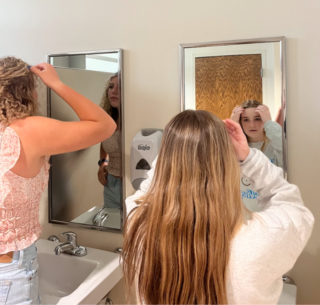The Beauty Standard’s Impact on How HSJI Members Interact
Beauty evokes fear when face-to-face with it—especially when you’re in high school. Earlier this week, approximately 250 high school students gathered at Indiana University for the High School Journalism Institute Program. Many of them, having arrived knowing nobody else, confronted the intimidation that is first impressions. Even if they don’t realize it, this anxiety can be largely caused by underlying societal beauty standards.

Ruby Pittenger and Molly Mullen stare at their reflection in the mirror at HSJI. Photo by Sabrina Paul
First impressions are so intimidating because of the implicit impressions that come with them. When talking about implicit impressions, Irmak Olcaysoy Okten in his article describes the ways in which people quickly and unconsciously judge each other.
“Implicit measures aim to capture the spontaneous impressions that are typically invisible to the perceivers—impressions they have formed without any awareness or intention,” says Okten.
Gracyn Erickson, HSJI student, concedes with this idea.
“In this day and age, with instant gratification and social media, we’re all just very quick to assume things about anyone and it doesn’t take a lot,” says Erickson.
Adam Wang with Psychology today analyzes how attraction affects our willingness to interact.
“Being too attractive can also make people seem unapproachable,” says Wang.
When meeting new people in situations such as HSJI, the beauty standard and the fear of first impressions go hand in hand to make meeting new people feel impossible.
The beauty standard is a complicated and highly influential issue within society. Throughout the years, it has evolved. Gillian Paxton, HSJI staff, believes that today’s beauty standard is more racially ambiguous than in the past, though it is still somewhat eurocentric. However, Vanessa Burr, HSJI student, believes that it ranges from person to person. However you may view it, everyone feels the pressure of the beauty standard. For some, the way to break out of it is through alternative fashion, though it’s not always easy.
“I find myself really drawn to the idea of really dressing the way that makes you happy. I think it’s really hard to do that though nowadays because of jobs and the pressure of other people’s judgment,” says Paxton.
Younger generations have been expressing themselves more frequently and openly, alternative fashion being one example of this. This is the first step in the revolution towards ending the beauty standard.
According to Erickson, “I think if we got to a place where people got to dress themselves and look the way they wanted to, we’d be in a lot better place.”

